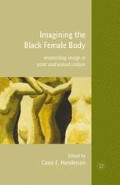Abstract
The late 1990s were watershed years for two young African American artists—one a celebrated playwright, and the other a critically acclaimed visual artist—who employ and rework racist stereotypes in their work. In 1996, Suzan-Lori Parks’s play Venus premiered at Yale Repertory Theatre. The following year, Kara Walker won a MacArthur Fellowship and had her work chosen for inclusion in the Whitney Biennial, among other high-profile exhibitions during that time. Their rise to prominence and ensuing successes, however, were marked by controversy surrounding their work’s incorporation of grotesque stereotypes, a debate that still reverberates in discussions of their art. In a 1997 article, Jean Young accused Parks of the “re-objectification and re-commodification” of Venus’s historical antecedent, Saartjie Baartman. The same year, The International Review of African American Art charged Walker with repackaging damaging stereotypes and selling them to white audiences. Amid dismay at “offensive” images, a Walker piece was pulled from a show at the Detroit Institute of Arts in 1999 (Newkirk 45). The women were part of a postmodern resurgence of minstrelsy (insofar as it ever went away), a trend that Spike Lee was to take advantage of in his film Bamboozled (2000).
Access this chapter
Tax calculation will be finalised at checkout
Purchases are for personal use only
Preview
Unable to display preview. Download preview PDF.
Works Cited
Anderson, Lisa M. Black Feminism in Contemporary Drama. Urbana: U of Illinois P, 2008. Print.
Armstrong, Elizabeth. “Kara Walker Interviewed by Liz Armstrong” No Place (Like Home). Ed. Elizabeth Armstrong. Minneapolis: Walker Art Center, 1997. Print.
Bakhtin, Mikhail. Rabelais and His World. Trans. Helene Iswolsky. Indianapolis: Indiana UP, 1984. Print.
Bernard, Louise. “The Musicality of Language: Redefining History in Suzan-Lori Parks’s The Death of the Last Black Man in the Whole Entire World.” African American Review 31 (1997): 687–99. Print.
Bhabha, Homi K. “The Other Question—the Stereotype and Colonial Discourse” Screen 24.6 (1983): 18–36. Print.
Bowles, Juliette. “Extreme Times Call for Extreme Heroes” International Review of African American Art 14.3 (1997): 3–16. Print.
——. “Stereotypes Subverted? The Debate Continues.” International Review of African American Art 15.2 (1998): 44–51. Print.
Carpenter, Jane H., and Betye Saar. Betye Saar. Petaluma, CA: Pomegranate, 2003. Print.
Carpio, Glenda R. Laughing Fit to Kill: Black Humor in the Fictions of Slavery. Oxford: Oxford UP, 2008. Print.
Carroll, Noël. “Ethnicity, Race, and Monstrosity: The Rhetorics of Horror and Humor.” Beauty Matters. Ed. Peg Zeglin Brand. Bloomington: Indiana UP, 2000. 37–56. Print.
Cassuto, Leonard. The Inhuman Race: The Racial Grotesque in American Literature and Culture. New York: Columbia UP, 1997. Print.
Cohen Shabot, Sara. “The Grotesque Body: Fleshing Out the Subject.” The Shock of the Other: Situating Alterities. Ed. Silke Horstkotte and Esther Peeren. Amsterdam: Rodopi, 2007. 57–68. Print.
DuBois Shaw, Gwendolyn. Seeing the Unspeakable: The Art of Kara Walker. Durham, NC: Duke UP, 2004. Print.
Elam, Harry, Jr., and Alice Rayner. “Body Parts: Between Story and Spectacle in Venus by Suzan-Lori Parks.” Staging Resistance. Ed. Jeanne Colleran and Jenny S. Spencer. Ann Arbor: U of Michigan P, 1998. 265–82. Print.
Eyerman, Ron. Cultural Trauma: Slavery and the Formation of African American Identity. Cambridge, UK: Cambridge UP, 2001. Print.
Garrett, Shawn-Marie. “Return of the Repressed.” Theater 32.2 (2002): 26–43. Print.
Gates, Henry Louis, Jr. The Signifying Monkey. New York: Oxford UP, 1988. Print.
Gray, Herman S. Cultural Moves. Berkeley: U of California P, 2005. Print.
Hyman, Timothy, and Roger Malbert. Carnivalesque. London: Hayward Gallery, 2000. Print.
King, Debra Walker. African Americans and the Culture of Pain. Charlottesville: U of Virginia P, 2008. Print.
Knight, Christopher. “Walker’s Rich Palette: Black and White.” Los Angeles Times 5 Mar. 2008, home ed., sec E:1. Print.
Kristeva, Julia. Powers of Horror: An Essay on the Abject. Trans. Leon S. Roudiez. New York: Columbia UP, 1982. Print.
Larson, Jennifer. “With Deliberate Calculation”: Money, Sex, and the Black Playwright in Suzan-Lori Parks’s Venus” Reading Contemporary African American Drama. Ed. Trudier Harris. New York: Peter Lang, 2007. 203–23. Print.
McAfee, Noëlle. Julia Kristeva. New York: Routledge, 2004. Print.
Miller, Greg. “The Bottom of Desire in Suzan-Lori Parks’s Venus” Modern Drama 45.1 (2002): 125–37. Print.
Morris, David B. The Culture of Pain. Berkeley: U of California P, 1993. Print. Newkirk, Pamela. “Controversial Silhouette.” ARTNews Sept. 1999, 45. Print. Nyong’o, Tavia. “Racial Kitsch and Black Performance.” Yale Journal of Criticism 15.2 (2002): 371–91. Print.
Parks, Suzan-Lori. The America Play and Other Works. New York: Theatre Com-munications Group, 1995. Print.
——. Red Letter Plays. New York: Theatre Communications Group, 2001. Print.
——. Venus. New York: Theatre Communications Group, 1997. Print.
Raymond, Yasmil. “Maladies of Power: A Kara Walker Lexicon” Kara Walker: My Complement, My Enemy, My Oppressor, My Love. Minneapolis: Walker Art Center, 2007. 347–69. Print.
Roberts, Diane. The Myth of Aunt Jemima: Representations of Race and Region. New York: Routledge, 1994. Print.
Russo, Mary. The Female Grotesque: Risk, Excess, Modernity. New York: Routledge, 1995. Print.
Vice, Sue. “Bakhtin and Kristeva: Grotesque Body, Abject Self” Face to Face: Bakhtin in Russia and the West. Ed. Carol Adlam et al. Sheffield, England: Sheffield, 1997. 160–74. Print.
Warner, Sara L. “Suzan-Lori Parks’s Drama of Disinterment: A Transnational Exploration of Venus” Theatre Journal 60 (2008): 181–99. Print.
Young, Jean. “The Re-Objectification and Re-Commodification of Saartjie Baartman in Suzan-Lori Parks’s Venus” African American Review 31 (1997): 699–709. Print.
Editor information
Copyright information
© 2010 Carol E. Henderson
About this chapter
Cite this chapter
Burrell, J. (2010). The Lower Stratum of History. In: Henderson, C.E. (eds) Imagining the Black Female Body. Palgrave Macmillan, New York. https://doi.org/10.1057/9780230115477_8
Download citation
DOI: https://doi.org/10.1057/9780230115477_8
Publisher Name: Palgrave Macmillan, New York
Print ISBN: 978-1-349-29053-6
Online ISBN: 978-0-230-11547-7
eBook Packages: Palgrave Literature CollectionLiterature, Cultural and Media Studies (R0)

